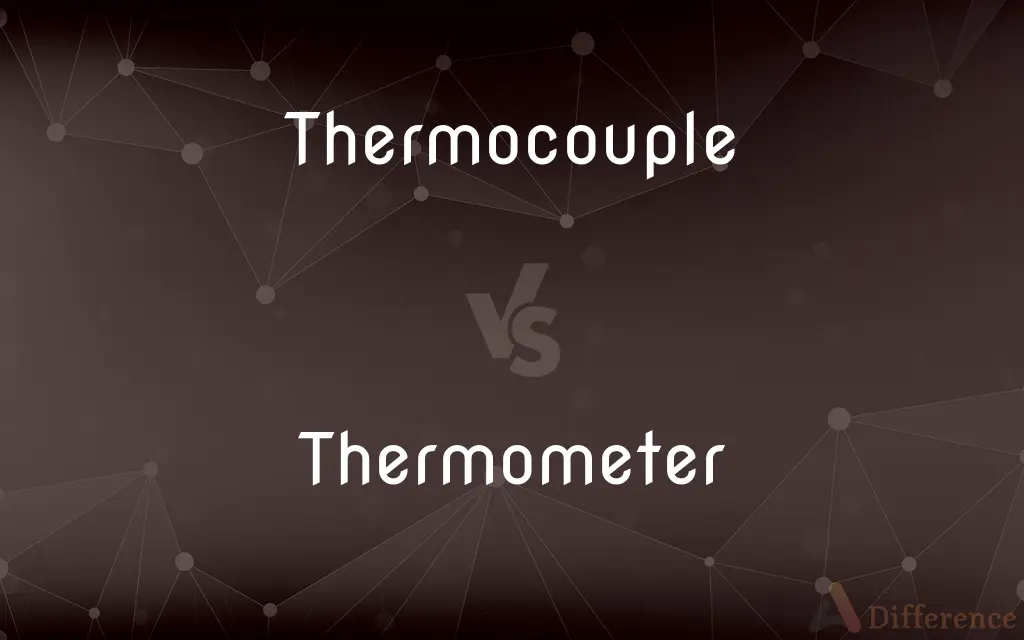Thermocouple vs. Thermometer — What's the Difference?
By Tayyaba Rehman — Updated on October 30, 2023
A thermocouple is a sensor converting temperature differences into electrical voltage, while a thermometer measures temperature directly.

Difference Between Thermocouple and Thermometer
Table of Contents
ADVERTISEMENT
Key Differences
A thermocouple consists of two different metal wires joined at one end, creating a junction. When this junction experiences a change in temperature, it produces a small voltage. A thermometer, on the other hand, is a device designed to measure temperature directly, either by expansion of a fluid, electronic means, or other methods.
Thermocouples are often used in industrial settings and scientific research due to their ability to measure a wide range of temperatures and their robustness in harsh environments. Thermometers, however, are commonly found in everyday settings, like medical offices or households, to provide direct temperature readings.
The working principle of a thermocouple relies on the Seebeck effect, which states that a voltage will be produced when different metals are exposed to a temperature gradient. Thermometers, depending on their type, might operate based on fluid expansion, electrical resistance, or infrared radiation.
Thermocouples require a reference temperature and are mainly used for differential temperature measurements. Thermometers provide an absolute temperature reading and are usually calibrated against a standard scale, such as Celsius or Fahrenheit.
In terms of precision, a laboratory-grade thermometer might provide more precise readings for a specific temperature range. In contrast, thermocouples can work over a broader range but might require more intricate calibration and equipment.
ADVERTISEMENT
Comparison Chart
Principle of Operation
Uses Seebeck effect to generate voltage.
Measures temperature via various methods.
Usage Environment
Common in industrial and research settings.
Common in households, medical, and labs.
Temperature Range
Typically wide-ranging.
Specific to type and calibration.
Reading Type
Differential, requires reference temperature.
Absolute, calibrated against standard scales.
Durability
Robust, can function in harsh environments.
Some are delicate, others robust like infrared.
Compare with Definitions
Thermocouple
A sensor used to detect or measure temperature based on the voltage it produces.
In the industrial oven, a thermocouple ensures temperatures are consistent throughout the baking process.
Thermometer
A device that indicates temperature by a physical property that changes with temperature.
The mercury thermometer showed a reading below freezing.
Thermocouple
An instrument comprising two dissimilar conductors forming electrical junctions at differing temperatures.
The thermocouple's unique construction allows it to generate an electrical signal based on temperature differences.
Thermometer
A gauge that measures and presents the temperature of a given environment.
Using an infrared thermometer, the mechanic checked the engine's heat.
Thermocouple
A device harnessing the Seebeck effect to measure temperature differences.
We replaced the old thermocouple to improve the efficiency of our temperature monitoring system.
Thermometer
An instrument used to measure and display temperature.
She checked her child's fever using a digital thermometer.
Thermocouple
A device that produces a voltage when its ends are at different temperatures.
The technician connected the thermocouple to measure the temperature gradient inside the furnace.
Thermometer
A tool calibrated to show temperature changes, often in Celsius or Fahrenheit.
The classroom had a wall thermometer to monitor indoor temperatures.
Thermocouple
A temperature-measuring tool consisting of two different metals connected at two points.
The thermocouple revealed a rapid change in temperature near the reactor's core.
Thermometer
An apparatus used for detecting the degree of heat in objects or spaces.
With the oven's built-in thermometer, she ensured the roast cooked at the right temperature.
Thermocouple
A thermocouple is an electrical device consisting of two dissimilar electrical conductors forming an electrical junction. A thermocouple produces a temperature-dependent voltage as a result of Seebeck effect, and this voltage can be interpreted to measure temperature.
Thermometer
A thermometer is a device that measures temperature or a temperature gradient (the degree of hotness or coldness of an object). A thermometer has two important elements: (1) a temperature sensor (e.g.
Thermocouple
A thermoelectric device for measuring temperature, consisting of two wires of different metals connected at two points, a voltage being developed between the two junctions in proportion to the temperature difference.
Thermometer
An instrument for measuring temperature, especially one having a graduated glass tube with a bulb containing a liquid, typically mercury or colored alcohol, that expands and rises in the tube as the temperature increases.
Thermocouple
A thermoelectric device used to measure temperatures accurately, especially one consisting of two dissimilar metals joined so that a potential difference generated between the points of contact is a measure of the temperature difference between the points.
Thermometer
An apparatus used to measure temperature.
Thermocouple
(physics) A transducer consisting of two different metals welded together at each end; a voltage is produced that is proportional to the difference in temperature between the two junctions (one of which is normally held at a known temperature)
Thermometer
An instrument for measuring temperature, founded on the principle that changes of temperature in bodies are accompanied by proportional changes in their volumes or dimensions.
Thermocouple
A thermoelectric couple.
Thermometer
Measuring instrument for measuring temperature
Thermocouple
A kind of thermometer consisting of two wires of different metals that are joined at both ends; one junction is at the temperature to be measured and the other is held at a fixed lower temperature; the current generated in the circuit is proportional to the temperature difference
Common Curiosities
How does a thermometer work?
A thermometer measures temperature directly, using methods like fluid expansion, electrical resistance, or infrared radiation.
Are thermocouples used in households?
Thermocouples are mainly used in industrial and scientific settings, though some household appliances may utilize them.
Can I use a thermometer to check my body temperature?
Yes, medical thermometers are specifically designed for body temperature readings.
What's the range of a typical household thermometer?
Household thermometers usually measure from below freezing to boiling point, but the range varies by type.
What is a thermocouple?
A thermocouple is a sensor that converts temperature differences into electrical voltage.
Are infrared thermometers accurate?
Infrared thermometers can be accurate but may require proper calibration and usage.
Do all thermometers contain mercury?
No, while some older thermometers use mercury, many modern ones use alcohol, digital sensors, or infrared technology.
What's the principle behind a thermocouple's operation?
Thermocouples operate based on the Seebeck effect, producing voltage with temperature differences.
Do thermometers need calibration?
Some thermometers, especially those used in professional settings, benefit from periodic calibration for accuracy.
How accurate is a thermocouple?
Thermocouples can be accurate, but they often require calibration and a reference temperature.
How long do thermocouples last?
Lifespan varies based on usage and environment, but some can last for years in ideal conditions.
Why do thermocouples have two different metals?
The two metals generate a voltage when subjected to a temperature difference, allowing temperature measurement.
Can I measure the temperature of a flame with a thermocouple?
Yes, thermocouples are often used to measure high temperatures like those of flames.
What's the difference between a thermocouple and a thermometer's temperature range?
Thermocouples typically have a wider range, while thermometers' ranges are specific to their type and calibration.
Is it safe to immerse a thermometer in water?
It depends on the type; some thermometers can be immersed, but others, especially electronic ones, cannot.
Share Your Discovery

Previous Comparison
Flapjack vs. Pancake
Next Comparison
Faun vs. SatyrAuthor Spotlight
Written by
Tayyaba RehmanTayyaba Rehman is a distinguished writer, currently serving as a primary contributor to askdifference.com. As a researcher in semantics and etymology, Tayyaba's passion for the complexity of languages and their distinctions has found a perfect home on the platform. Tayyaba delves into the intricacies of language, distinguishing between commonly confused words and phrases, thereby providing clarity for readers worldwide.
















































